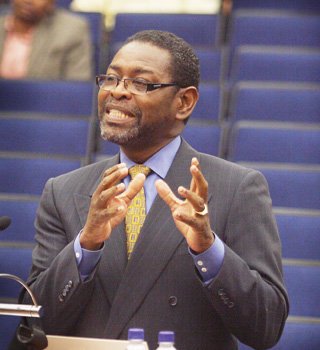Mayor forces out his No.2 at City Hall
Jeremy M. Lazarus | 9/23/2014, 6 a.m.
Mayor Dwight C. Jones once considered Byron C. Marshall indispensable to his administration.
For at least three years, the mayor quietly showered Mr. Marshall with thousands of dollars in bonuses as a reward for his work in managing City Hall as chief administrative officer. Mayor Jones also doubled Mr. Marshall’s deferred compensation for retirement and provided other perks to keep him from being wooed away by another locality.
But somehow the mutual respect and trust between them eroded in recent months.
In an unexpected move, Mayor Jones, who has a little more than two years left in office, abruptly ousted Mr. Marshall, the No. 2 official at City Hall.
On Monday, the mayor simply announced he had accepted Mr. Marshall’s “resignation” and wished him well.
Mr. Marshall, 63, could not be reached for comment, though he has told others that he is not unhappy about leaving the City Hall pressure cooker and had no trouble accepting his ouster because he served at the pleasure of the mayor.
What he will do next is unknown. He is due a severance package worth more than $105,000.
Leaving an office in Richmond is not a career-breaker. Harry Black, a former chief financial officer who battled with City Council, has gone on to serve as chief financial officer in Baltimore and just became the city manager of Cincinnati.
How much impact Mr. Marshall’s departure will have is uncertain. As CAO, Mr. Marshall had his finger in every pie at City Hall in his role as the final decision-maker for the administration. He held sway over hiring and firing and had to approve all contracts.
Still, for most city residents, the change at the top is mostly a curiosity with little impact on daily life. Police are still patrolling, trash is being picked up and other operations are continuing without interruption.
As the mayor put it, “We have a capable team in place — many of whom have been with me since the beginning — and we are moving forward without interruption.”
The mayor named Christopher L. Beschler, the city’s chief operating officer, as interim CAO with full authority to hire and fire employees, sign contracts and take other actions on behalf of the city. Mr. Beschler also served as acting CAO during the final year of former Mayor L. Douglas Wilder’s administration.
City Council must confirm the interim CAO’s appointment. A special meeting will be held 8:30 a.m. Friday to confirm Mr. Beschler’s appointment.
Mr. Marshall’s departure gained interest when the mayor did not issue any explanation for the resignation. He apparently briefed some council members, but only after demanding each sign a confidentiality agreement in a bid to prevent leaks — a first for City Hall. The mayor even brought in an outside legal expert on such matters to craft the agreement. Five council members signed, while four did not.
The four council members who did not sign were Jonathan T. Baliles, 1st District; Chris A. Hilbert, 3rd District; Parker C. Agelasto, 5th District; and Reva M. Trammell, 8th District.
Two sources with knowledge of the circumstances said the mayor has felt for months that Mr. Marshall had not done a good job as the ramrod for the grand plan to bring a baseball stadium and other developments to Shockoe Bottom.
At this point, a complete plan has yet to be developed and presented to a balky council. At least five members are opposed to moving the stadium from the Boulevard to the 17th Street area of Downtown, and two have made the failure to produce a complete plan an element of that opposition.
The final straw for the mayor, sources said separately, came in late August when Mr. Marshall had his lawyer go public with a letter blasting the city auditor for accusing him of wrongdoing.
Mr. Marshall’s ire was related to the auditor’s published claims that Mr. Marshall sought to benefit the city’s former top financial officer, Sharon Judkins, by providing her a sweetened pension when she was dismissed from her job. The mayor was upset at the public conflict.
Mr. Marshall came to Richmond with experience in several cities including Austin, Atlanta and Washington. He was regarded as a consummate professional who had information at his fingertips and spoke calmly and directly no matter the situation.
When he arrived in June 2009, Mr. Marshall said he was “excited about Richmond’s potential.”
Most council members considered him a knowledgeable and responsive straight shooter who sought to improve city operations and improve service to residents.
Several council members expressed disappointment and regret this week about his departure.







